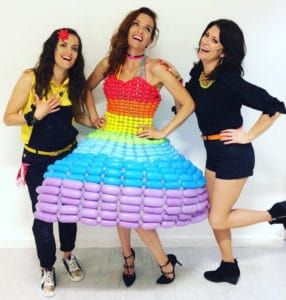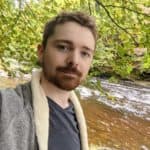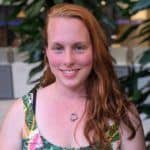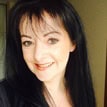Profile
Neil Barnby
-
About Me:
I live in Hull and always have, but I do love to travel. As a day job I am called a Data Science Product Manager but I love singing and drama and help out at some music and drama festivals in my free time. I also like balloon modelling and have been known to make some strange models from them, including a number of dresses!

-
Read more
The balloon modelling got me hooked after I made a simple dog from a balloon. That led to me learning about making characters like Mickey Mouse and Spiderman and eventually as I got better I found balloon weaving, which allowed me to make dresses.
Another hobby over the years has been magic and this has included ‘escapology’ or how to escape, usually from handcuffs, straight jackets etc. This was an interest since I was 8 years old. Later I used these skills in talks I have done about my work in prisons, where I volunteer to help prisoners learn digital skills. This led to my TEDx talk and I even got involved in helping prisoners create an animation for the Manchester Film Festival, so I mixed my drama interest with my digital media interest.
I never did very well at school. I failed my Maths ‘O’ level (old GCSE) and we didn’t have any kind of computer qualifications. I left school with just three ‘O’ levels: English, Biology and Geography. I was told I could never get a degree and should consider working in a kitchen. I did work in a kitchen and even qualified as a Chef, but this made me realise that I could do more if I studied, so I studied in my local library, teaching myself electronic engineering. Later I became a radio and cellular phone engineer. This led me to gain a degree with the Open University. In later years I found out that my lack of success at school was probably due to me having Meares Irlen Syndrome, which is like Dyslexia and also having Autistic Spectrum Disorder (ASD).
Back in the 1980s I created the first online bulletin board system or BBS, which was the first one in the UK. The BBS system was the first way that the public could send messages digitally, like email. That is when I first got into computers, in 1980. By 1986 I had learned to program and started building ‘expert systems’ as a hobby, which were an early type of AI (Artificial Intelligence). When I studied my degree I studied Robotics and this included AI. The AI in university included neural networks which is what drives Large Language Models (LLMs) like ChatGTP.
Now I work with AI every day as my team develops AI models for use in Government that helps the Criminal Justice System (CJS).
Not bad for someone who failed Maths!
-
My pronouns are:
My pronouns are He/Him
-
My Work:
I am a Data Science Product Manager. I direct a team of Data Scientists to build Artificial Intelligence systems for the Criminal Justice System.
-
Read more
My team builds AI models. The team is made up mainly of Data Scientists and Data Analysts. Leading those is a Lead Data Scientist and she directs them and organises the development of the models we build. She has to know about lots of different AI models, and there are many, and she has to know them in depth, so she is a specialist.
My job is more varied than the Data Scientists’ jobs, including the Lead Data Scientist. Although the Lead will tell the team what to do, I have to set the priority of the tasks and the products (which are algorithms) that we work on. I have to have an understanding of all the models, but not in the depth that the Data Scientists do. I have to understand how they work so that I can prioritise and also explain them to non-technical people. I have to assess what value the product has to its users and the Government and make decisions of whether we should continue the work or do something different.
I also have to have knowledge of the user experience (UX) which is how the end users experience the product, how it makes them feel, how easy it is to use and how important it is to them. This is done through user research, which I organise and a User Researcher does. I then use the results to help me get a feeling for value to the user. I have to understand the needs of the stakeholders (the people who are not users but have an interest such as those paying to build the products, in my case the Government and the public). I also have to understand the technical parts of the product including coding, IT equipment, bandwidth and programming languages. Finally, I have to understand AI. Not just the different models but also how we use the data, ethics (whether using the data puts anyone’s rights at risk), latest AI tends and how the public and Government feel about AI and its use.
I also have to market the product, in other words I have to create interest in it and try to get people want it to exist. I have to assure people that it is safe and analyse some metrics (figures that tell us how well it works and make sure it does not start behaving oddly).
So my job has some aspects of business in it, but it is largely about computing and data analysis.
It also means I can work from home sometimes, but also means I have to travel to London and Leeds quite a lot.
-
My Typical Day:
On a typical day I wake at around 8am and have breakfast, usually plenty of coffee!
I open my laptop and switch on my phone at 9am, although my hours are flexible, I like routine. I talk to my team and see what they are doing for the day, so I can prioritise.I have some meetings of various types. Then I stop for lunch around 12 noon. In the afternoon I will often get involved with some problem solving, some are code, some are data and some maybe explaining why our AI is not taking over the world today. I then finish around 5pm.
-
Read more
My days can vary quite a bit. In government we use something called Agile methodology, which is a way of working to develop digital products. basically it means we do projects in short periods of time and start with the simplest possible product and then build it up in steps to a larger one. The important thing is that each stage has to be a working product and it is led by the users. As part of this we have something called Agile Ceremonies. These are the planning meetings and review meetings for each stage of the product. So often my day involves these ceremonies and that is the case for the whole team.
Part of this, each day starts with a stand-up. This is a short meeting, where each member of the team says what they worked on yesterday (or last time) and what they are doing today. They then say if they need any help, so others can volunteer to help. Every team directs itself, so there is no big boss telling us what to do every day. We are told we have to build X and it is up to us how we build it as long as we get it done and it is up to standard.
So the stand-up is the first meeting of the day, usually at 10am, so starting at 9am I can get emails and other messages read and answered and have time to think about what I might achieve today.
Depending on what comes out of stand-up I may have meetings with team members to help or to prioritise or they may just need me to meet others to find out information they need to get on with their work, such as a decision from a boss or a answer from a user.
I often then have to do some sort of presentation to explain our model or some technical terms to non-technical people, such as managers, policy makers, lawyers etc. and this may then have to explained to ministers.
I also go over the coding of models with the Data Scientists and make suggestions for improvements or point out possible issues, but also to make sure I fully understand how our models work. I may also have meeting with managers to decide on what products we have to prioritise next and what problems need solving with AI, or to present our work so far and decide if what we are trying to do is possible from a technical point of view and an ethical one.
I also have to research into the latest AI trends and what the public and government think about the use of AI, what their worries are and make plans to answer any questions that may come from that.
One of the easiest parts of my job is chatting. I have to know people across lots of companies and departments so part of my job is just chatting to people, which still seems weird.
My hours are flexible so as long as I do the right amount of hours and fit in with meetings and ceremonies I can start and finish when I want and take my lunch when I want. I like routine so I usually start at 9am and finish at 5pm and take my lunch somewhere between 12 and 1pm.
-
What I'd do with the prize money:
I would use the prize money to organise a workshop in some schools showing how we teach some Agile methodology in digital development to our teams.
-
Education:
I went to a junior high school (they don’t exist now) called Endike Junior High in Hull, it was an all boys school. There I enjoyed science because the teacher was fun and made it fun. He had cartoons around the classroom wall based on a character called Ivan Idea. We also had a maths teacher at that school who did a lot of practical experiments in maths and I learned how to measure the height of a tree using trigonometry.
After that I went to Sir Henry Cooper, which was a comprehensive school, which is where everyone went if they didn’t go to a grammar school or a private school. I missed the old eleven plus by a year so didn’t have that exam. I studies Chemistry, Maths, Biology, French, Geography, Sociology, Cookery (now called food tech) and English. In maths we got to see a computer, this is before the general public really had ever seen them and it was just like a big keyboard, a printer and a punched card reader (this is something that takes in a cardboard strip with holes in and that is how it was programmed. this whole thing made me want to know more about computers, that I had only seen on science fiction movies, but that was not an option for someone from a poor background like mine.
After school I could not get work so I went to college and trained as a chef. I still couldn’t get work when I left so got a bar job and taught myself electronics. I got a job fixing CB radios and then one working on two way radios, and this led to me starting a degree in the Open University, which got me into learning about AI.
Later I did more college courses in electronics, computers and programming.
After many years I did a teaching qualification to become a teacher and had to then re-take my maths, which I passed this time. I was 50 years old when I passed my maths.
I taught computer coding and that led to my current career. -
Qualifications:
3 O Levels: English, Biology and Geography
City & Guilds: Hotel Management, Electronic Servicing, Microprocessors, Java Programming, Internet Services, Web Design, Networking and TV Engineering.
CLAIT, ECDL
BSc. Hons Robotics and Computing (Open)
BSc. Computing
PGCE (Lifelong Learning)
-
Work History:
As mentioned before I started as a Chef and Barman, then went into being a Two Way Radio Engineer. I then developed further into a Cellular Phone Engineer and a Cellular Base Station Engineer. Computer Engineer after that for Dixons Stores Group which then bought PC World. I then worked for CompuServe and AOL (Internet companies) as a Technical Support Engineer and then Virgin Internet as a Freelance Web Developer. I went on to be a Director of an Internet Company that hosted websites and then a Teacher in Networking and Internet Services. I then worked as a Teacher In prisons teaching IT and programming (coding) and finally a Data Science Product Manager (a job that didn’t exits 5 years ago)
-
Current Job:
Data Science Product Manager
-
Employer:
Ministry of Justice, Data & analytics
-
My Interview
-
How would you describe yourself in 3 words?
Escaping Product Manager
What did you want to be after you left school?
I wanted to be a Dietician
Were you ever in trouble at school?
Sometimes
If you weren't doing this job, what would you choose instead?
Ice Cream Manufacturer
Who is your favourite singer or band?
David Bowie
What's your favourite food?
Ice Cream
If you had 3 wishes for yourself what would they be? - be honest!
Live in a warmer country, not have to work, be able to stop time.
Tell us a joke.
What's the difference between a buffalo and a bison? Answer: you can't wash your hands in a buffalo
-






